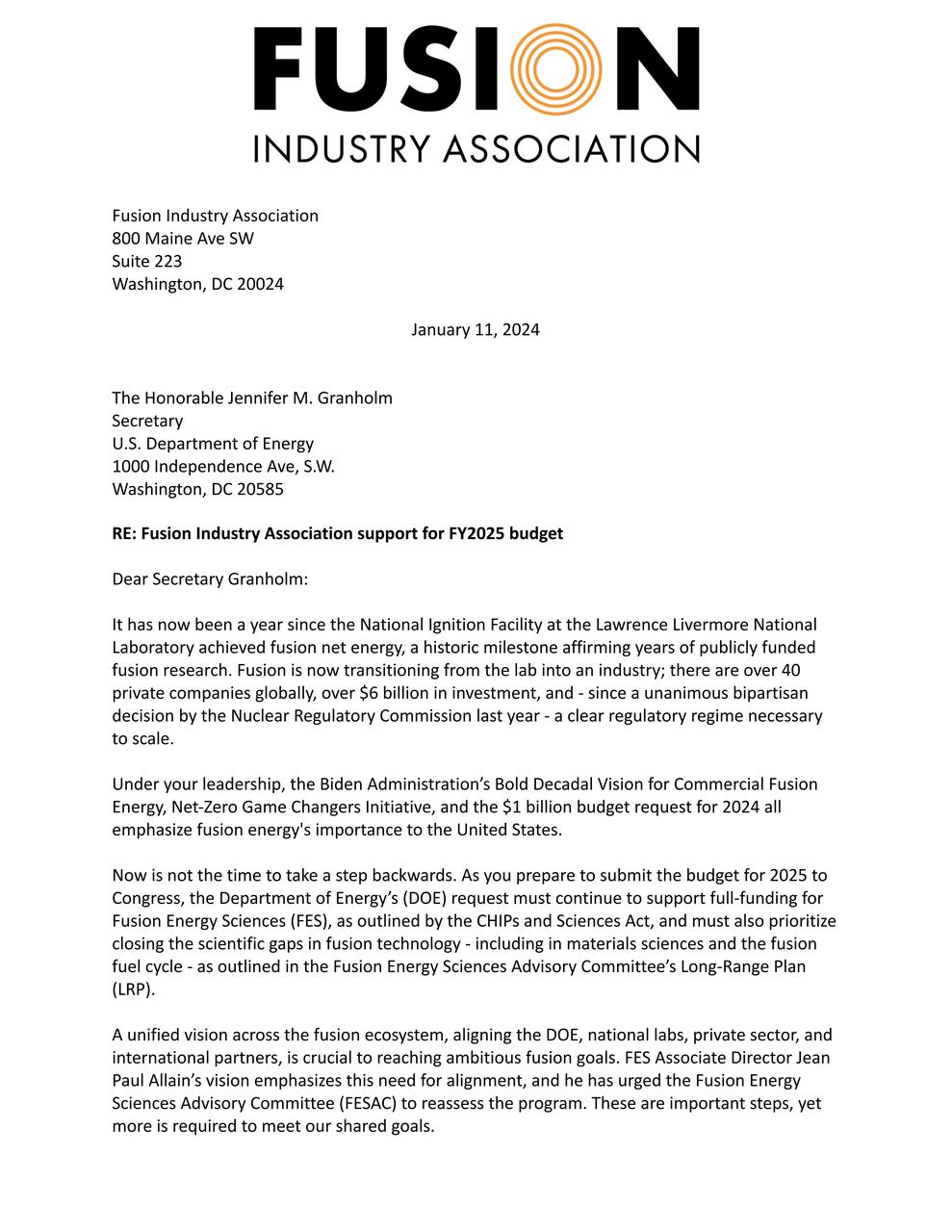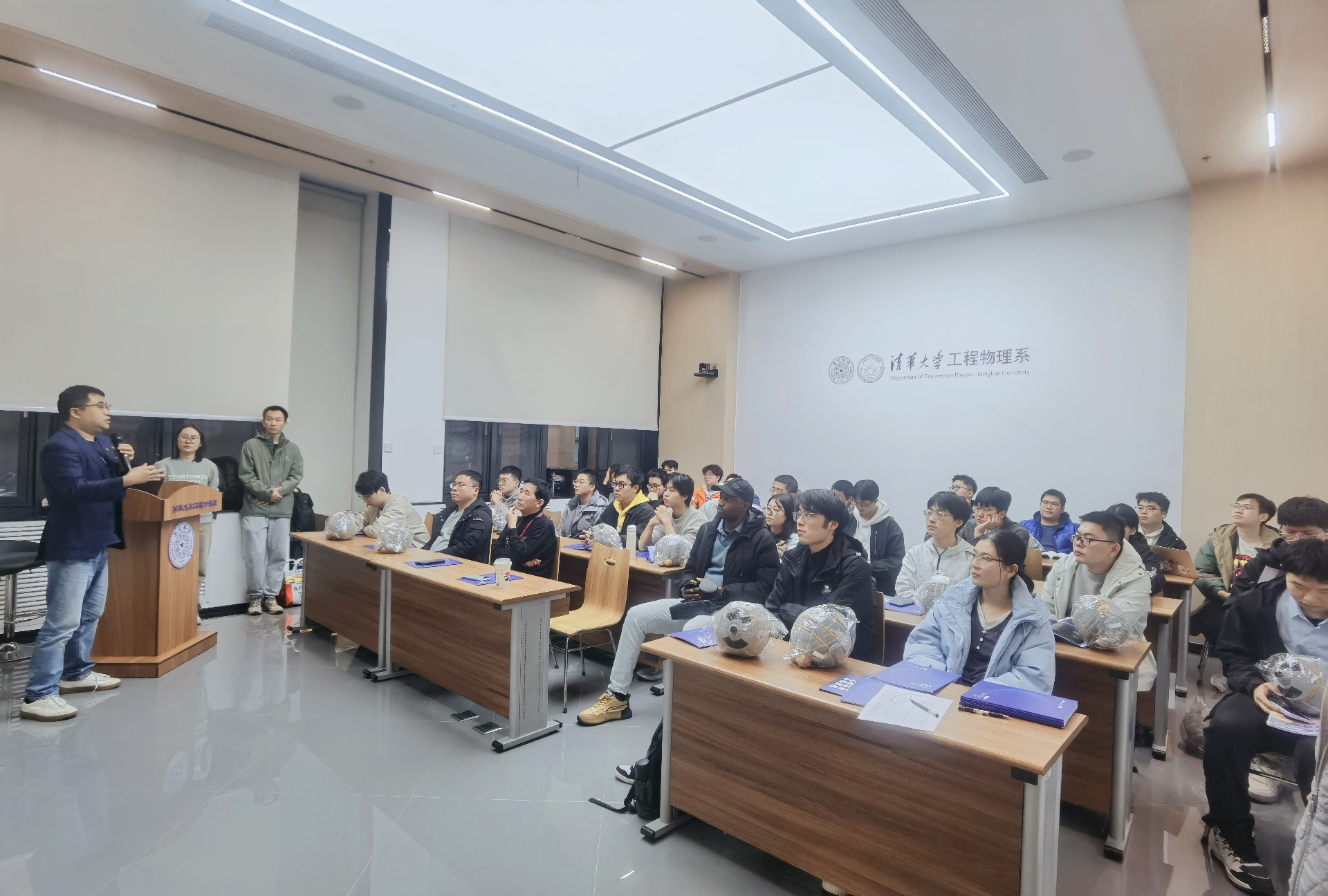Recently, the Fusion Industry Association (FIA) sent a letter to the U.S. Secretary of Energy, Granholm, expressing support for increasing funding and prioritizing the commercialization of fusion energy in the upcoming 2025 budget request to be submitted to the U.S. Congress. It is reported that the Biden Administration has made fusion policy a priority, by announcing a Bold Decadal Vision for Commercial Fusion Energy and requesting $1 billion in the 2024 budget for fusion research. However, Congress has yet to act on the budget and the DOE needs to act with more urgency. In response to this, Andrew Holland, the CEO of the Fusion Industry Association, emphasized the urgency of the matter in the letter and stated that the United States "It is crucial to reaching ambitious fusion goals." and "must continue to support full-funding for Fusion Energy Sciences (FES)" in order to maintain a leading position in this game-changing new technology.
Fusion Development Picking up Speed
Controlled nuclear fusion technology is an important component in the exploration of clean energy solutions. The U.S. government has released a series of policies since 2019, including the Nuclear Energy Innovation and Modernization Act (2019), the Inflation Reduction Act (2022), and the U.S. Government Fiscal Year 2024 Budget (2023), to continuously increase support for the field of controlled nuclear fusion.
In March 2023, the White House released the Budget of The U.S. Government for Fiscal Year 2024. To promote the development of emerging technologies, the Budget includes 25 billion US dollars, an increase of 35.14% (18.5 billion US dollars in 2023). with a plan to provide 1 billion dollars to accelerate the realization of fusion energy. In September, U.S. Secretary of Energy Granholm stated that the Biden administration aims to establish a commercial fusion facility within the next ten years as part of the transition to clean energy. At the 28th Conference of the Parties (COP28) to the United Nations Framework Convention on Climate Change held in Dubai in December, United Arab Emirates, U.S. Special Presidential Envoy for Climate John Kerry announced that the United States would collaborate with other countries to launch an international cooperative program aimed at advancing fusion development. This initiative aims to accelerate the commercialization process of fusion power generation and marks the first time the U.S. has proposed such an international strategic cooperation plan to promote the commercialization of fusion energy.
However, the U.S. Congress has yet to take action on the $1 billion budget allocation for the fusion field. In response to this, the CEO of the Fusion Industry Association Andrew Holland, emphasized the urgency of the matter in his letter, stating, "To achieve fusion deployment within a decade, urgency is needed. Bipartisan support in Congress exists to prioritize fusion R&D despite the budget constraints of the Fiscal Responsibility Act. Without increased funding to support commercialization, the U.S. risks lagging behind other nations to deploy this game changing new technology.. Prioritizing funds toward commercially relevant fusion R&D aligns with the consensus of the U.S. fusion community and should be a guiding principle in the 2025 budget request. The U.S. will not meet your goals through the status quo of funding levels and R&D priorities."
Great Power Competition and Global Acceleration
In recent years, global competition surrounding controlled nuclear fusion technology has been accelerating. According to a report released by the Fusion Industry Association in July 2023, global financing for the commercialization of controlled nuclear fusion exceeded $6.2 billion in 2023, an increase of approximately $1.4 billion compared to $4.8 billion in 2022, representing a year-on-year growth of 27%. The letter sent by the Fusion Industry Association to U.S. Secretary of Energy Granholm signifies an increased sense of urgency regarding the competition in the field of controlled nuclear fusion, with some commentators suggesting that global financing in the field will hit a record high in 2024.
China has also been increasing policy support and investment in the field of controlled nuclear fusion in recent years. Since 2023, the State-owned Assets Supervision and Administration Commission of the State Council has launched the Future Industry Sailing Action, clearly identifying controlled nuclear fusion as an important direction for future energy. Andrew Holland explicitly pointed out in the letter that other nations, including China, are swiftly advancing their fusion programs. "They are building the hardware necessary to close technological gaps the U.S. identified years ago, but has not acted on." In December 2023, China they created a new national champion organization, the “China Fusion Corporation” with a press release saying “China takes the lead!” " In his view, this signal indicates that countries other than the United States are rapidly advancing their fusion projects towards commercialization.
Holland believes that The U.S., historically a leader, risks losing ground without strategic investments and a sense or urgency to meet this moment. He points out that thethe Department of Energy’s (DOE) request must continue to support full-funding for Fusion Energy Sciences (FES), as outlined by the CHIPs and Sciences Act, and must also prioritize closing the scientific gaps in fusion technology - including in materials sciences and the fusion fuel cycle. Holland added: "A unified vision across the fusion ecosystem, aligning the DOE, national labs, private sector, and international partners, is crucial to reaching ambitious fusion goals."

(图片来源:FIA)
参考资料:
[1]Fusion Industry Association Sends Letter on Fusion Budget to Secretary of Energy Grabholm.网址:https://www.fusionindustryassociation.org/fusion-industry-association-sends-letter-on-fusion-budget-to-secretary-of-energy-granholm/





